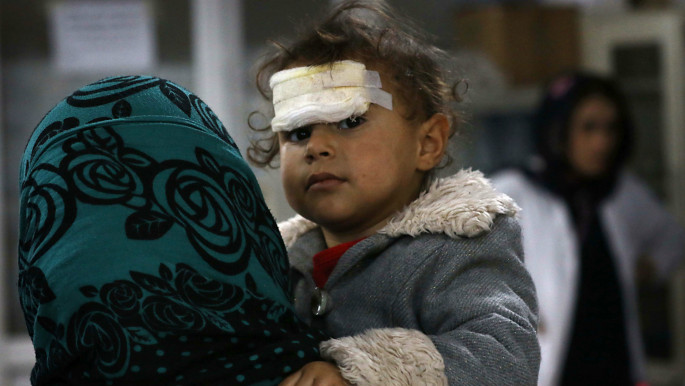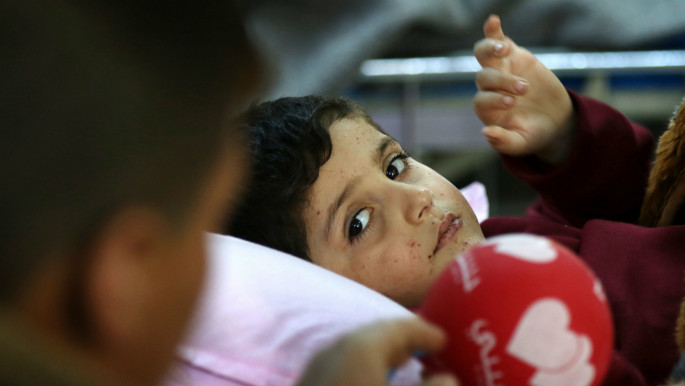Mosul children 'have seen things no one should see'
For when families finally settle in their makeshift shelters, the traumas of what they have seen and suffered begin to more fully sink in.
A generation of children escaping the Islamic State group's militant rule are not only facing life-changing injuries but also devastating psychological damage - which overwhelmed hospitals and humanitarian agencies are struggling to address, reports Amnesty International.
Of the thousands of children who have been exposed to sustained violence, only a fraction have access to the psychological care and support they desperately need, Amnesty said.
"Children caught in the crossfire of the brutal battle for Mosul have seen things that no one, of any age, should ever see," said Donatella Rovera, Amnesty International's Senior Crisis Response Adviser, who has just returned from a 17-day mission to northern Iraq.
"I met children who have not only sustained horrific wounds but have also seen their relatives and neighbours decapitated in mortar strikes, torn to shreds by car bombs or mine explosions, or crushed under the rubble of their homes."
 |
My children saw my sister being killed in front of them; they saw our neighbour who was decapitated in the strike; they saw body parts on the ground. How can they ever recover from that? |  |
In a hospital in Erbil, Amnesty spoke to Umm Ashraf, who described how she and her seven children were injured when a car bomb exploded outside the house where they were sheltering in east Mosul on 13 December. Her eldest daughter, 17-year-old Shahad, lost both her eyes in the attack.
"Our homes have become our children's graves," Umm Ashraf said. "My neighbours are still buried under the rubble; no one has been able to dig them out. I dragged my wounded children from under the rubble one by one.
"My children saw my sister being killed in front of them; they saw our neighbour who was decapitated in the strike; they saw body parts on the ground. How can they ever recover from that?"
At a camp for Internally Displaced People (IDPs), four-year-old Mohammed rocks to and fro, slaps himself and bangs his head on the floor.
He cries inconsolably every time he soils himself, which happens several times a day.
His mother, Mouna, says he has been behaving like this since the mortar strike on 12 November which killed two of his sisters.
"He and his little sister Taghreed were inseparable. He used to carry her all the time. Now he does not understand that his sisters are dead. He thinks we left them behind and gets sad and angry. I think he needs psychotherapy but there is nothing here in the camp," said Mouna.
 |
| Mosul children suffer pyschological trauma [Getty] |
While the humanitarian response has provided limited therapy, available resources are woefully inadequate to deal with the number of children who have been affected by the conflict, Amnesty said.
Excessive crying, mutism and violent behaviour, and reluctance to leave their parents' or carers' sides are just some of the signs of the trauma suffered by these children.
"The scars left by these unimaginably traumatic experiences are psychological as well as physical, but these life-altering wounds are being neglected by the Iraqi government and its allies, who have so far failed to ensure adequate medical facilities are in place," said Rovera.
 |
If there are resources for the war there must also be resources to deal with the consequences of war. |  |
"The international community must prioritise the resourcing of a robust child protection response, including comprehensive mental health support for those who have been exposed to extreme violence, as part of the humanitarian response to the Iraq crisis.
"If there are resources for the war there must also be resources to deal with the consequences of war."
Meanwhile, Yazidi children returning from IS captivity have endured unspeakable suffering. Girls as young as 11 were raped, while boys were forced to undergo military training, taught how to decapitate people, and made to watch executions.
"You grab the guy by the hair to pull his head up so you can cut his throat, and if he has no hair you stick two fingers in his nostrils to pull his head up. They taught me this and they taught me to kill in many other ways," Jordo, a 13-year-old boy who spent two years in IS captivity, told Amnesty.
AK, 10, returned from IS captivity in November, more than two years after being abducted along with his parents and seven siblings. His cousin and carer told Amnesty about the difficulties of coping with the erratic behaviour of the traumatised children.
"AK is very difficult to control," he said. "He breaks and sets things on fire, and the other day he went out in the cold in his underwear and got sick. All three of them wet themselves all the time, so we make them sleep in a separate tent because of the smell. These children are very traumatised and need professional help, but we have found no help so far."
With few or no functioning or accessible hospitals left in the conflict-affected areas, the best hope for the wounded to receive medical care is in Erbil, the capital of the semi-autonomous Kurdistan region.
Though it is only 80km away, getting to Erbil is almost impossible for residents of Mosul - only a few manage to get a special permit to enter the autonomous region.
Some families fleeing the fighting find themselves stuck between frontlines, unable to cross into territory controlled by the Kurdistan Regional Government and forced to wait in unsafe no-man's-land areas for days.
But even with a small proportion reaching Erbil, hospitals there have been overwhelmed by the casualties.
"The military campaign to recapture Mosul had been long in the making and the Iraqi authorities - including the Nineveh governorate - and their international partners in the Mosul battle could and should have made better provisions for the inevitable civilian casualties, especially knowing that hospitals in the KRG would likely come under strain from a high influx of war-wounded," said Rovera.
"Without more efforts by the Iraqi authorities and their allies to create safe avenues for civilians to get out of conflict-affected areas of the city and to provide essential services to residents trapped under fire inside Mosul, a humanitarian catastrophe could unfold."
Follow Shams al-Shakarchi on Twitter: @shams_shakarchi
![Mosul children [Getty] Mosul children [Getty]](/sites/default/files/styles/image_345x195/public/media/images/F0DC101A-D2A3-4701-A8A3-14B74BBC4BC1.jpg?h=d1cb525d&itok=RmJzj02k)



